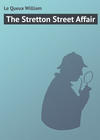Loe raamatut: «Her Royal Highness: A Romance of the Chancelleries of Europe», lehekülg 8
Chapter Fifteen.
Behind the Throne
After Hubert Waldron had left the corporal of Bersiglieri he entertained a distinct feeling that His Excellency the General knew more of the theft than he had admitted.
On his return to the Minister’s private cabinet he found His Excellency in consultation with his secretary, Pironti, a tall, thin-faced, black-haired man, with whom he presently held a long discussion regarding the theft. The secretary of the Council of Defence was also called, and the quartette sat for nearly an hour putting forward various theories as to how the documents could have been extracted. Up to the present it was a dead secret. But how long it would remain so was a question.
“Secrecy is all-important,” Waldron declared at last. “We must allow no word of this to leak out. It is His Majesty’s express command.”
“That sentry may possibly gossip,” remarked His Excellency, drawing slowly at his cigar stump, for he smoked perpetually.
“I have already impressed upon him the necessity for silence,” replied Waldron.
“In my own opinion the man knows something of the affair,” the General went on. “He was on sentry duty, and tells us that nobody whatsoever passed in here except we three. Yet, notwithstanding, the papers were stolen! He must have neglected his duty in some way – without a shadow of a doubt.”
“Yes,” replied his secretary, “I quite agree with Your Excellency that if he were continuously on duty, as he alleges that he was, then he must have seen the thief.”
“Probably bribed to remain silent,” His Excellency grunted suspiciously.
Waldron uttered no word. He watched the General’s face keenly and kept his own counsel.
“The affair is a complete mystery,” remarked Lambarini, who had spoken but little. “I, too, incline towards the opinion that the man, Tonini, knows the identity of the thief, but will not speak.”
“If I have him arrested then we might get him to open his lips,” His Excellency exclaimed. Waldron at once said:
“No. His arrest would betray the secret of Your Excellency’s loss. Besides, such an injudicious action would place a very serious obstacle in the channel of my present inquiries.”
“Then you are against his arrest. Why?”
“Because that man has told me the truth.”
The three high officials stared at the Englishman in surprise.
“Yes,” Waldron went on boldly, “I do not believe the man knows anything more than what he has already stated.”
“But what has he told you?” inquired Pironti, whose attitude showed that he was full of resentment that a foreigner should be employed by His Majesty to investigate the scandal.
“That, signore, is my own affair,” was Waldron’s cool reply as he rose from his chair.
“Pironti, have the corporal placed under arrest, and see that nobody speaks with him,” His Excellency ordered, a trifle pale with suppressed anger at Hubert’s words.
The latter, however, turned towards the Minister and said in a hard voice:
“I wish Your Excellency to remember that His Majesty the King has vested me with full powers on his behalf – as you will see by this decree,” and he drew a letter from his pocket. “Corporal Tonini is not to be arrested, nor is he to be threatened – or even approached. This inquiry is now in my hands, General Cataldi, not in yours. Please recollect that this is His Majesty’s orders, and that I am the King’s agent in this matter. Good morning.” And he turned and left the trio staring at each other in silence.
As he turned the corner under the high walls of the Palazzo Albani and walked up the narrow Via Quattro Fontane in the direction of his rooms in the Via Nazionale, he felt convinced that by His Excellency’s manner he had some knowledge of that package of documents.
Back in his own sitting-room he threw himself into a chair before the English coal fire – a luxury in Rome – lit his old briar pipe, and composed himself to reflect.
Ghelardi was one of the most renowned spies in Europe and would, without a doubt, know every secret agent of Austria who had recently been or was in Rome at that moment. Should he consult him? That was a very difficult problem, for from the outset he knew the old man would be antagonistic and would feel that the Englishman was usurping his position and power.
The Italian police official is remarkable for his cunning shrewdness and resourcefulness. In the Secret Police of Italy are men of remarkable, even astounding, tact and ability as investigators of crime. Even the ordinary plain-clothes policeman in Italy is, as a rule, a much more astute officer than those of the same grade in London, Paris, or Berlin. Indeed the Italian with his suave politeness, his natural shrewdness, his keen intelligence, and his suspicious nature makes a most excellent detective, and many of the cleverest officers of the Paris Sûreté and the detective departments of Berlin and New York have graduated through the Secret Police of Italy.
Old Ghelardi had all his life been brought up in that school, rising from an obscure clerk in the Questura in Naples to be a plain-clothes officer, and such distinction did he win in the capture of criminals that he quickly obtained promotion to Rome. As a young man it was he who, single-handed, captured the renowned Calabrian bandit, Bodrero, the fiend who at his trial boasted of having tortured and killed with his own hand over one hundred men, women, and children.
The anarchists, Palmera and Spineti, of Forli, he captured red-handed with their bombs, which they were about to throw at the carriage of the King’s father, and again, after a whole year’s diligent work, he had at last laid hands upon the two souteneurs, Civardi and Tedesco who, as probably will be remembered, murdered the young and pretty Countess Rinaldi in the Palazzo Rinaldi in Cremona and stole her jewels.
None could deny that Ghelardi was a very remarkable man. The German Government knew that, or they would not have seduced him from his office in Italy and given him the position of Chief of the Secret Service. A German appointment such as that is not given to a foreigner without considerable merit.
In a sense, Hubert admired him for his tact, courage, and untiring energy, and now, as he sat smoking and reflecting he remembered how, in his ignorance, he had up the Nile met the greatest secret agent of the present century and believed him to be a prosperous and rather antagonistic Frenchman!
It showed Ghelardi’s resourcefulness, for Waldron, keen, shrewd, cosmopolitan man of the world that he was, was not a person easily taken in.
Time was pressing. From one hour to another the Ministry of Foreign Affairs might receive a cipher dispatch from Vienna indicating that the objectionable documents had passed into the hands of the War Department there.
He knew quite well that His Majesty – who had that morning gone to the great review, a brilliant figure in uniform and sparkling decorations – had ridden there and was standing at the saluting point with a quickly beating heart. Peril, a grave and imminent peril, existed for the nation, for Austria, who for so long had desired some excuse for picking a quarrel with her neighbour, was now in a position to declare immediate war.
And with the great armies of Austria-Hungary against her, poor Italy must be ground beneath the iron heel of the invaders!
To-day it is the fashion for the public, gulled by the Press, to talk glibly of the Triple Entente and the Triple Alliance. The Man in the Street, be he in Plymouth or in Petersburg, Margate or Madrid, Rochester or Rome, believes that treaties duly translated and made in duplicate or triplicate, signed by the Sovereign, sealed with the Great Seal, and delivered with all the pomp and ceremony which diplomacy demands, are a safeguard against war. But your modern diplomat smiles, for he knows they are not.
Truly the situation in Europe would be comic, if it were not so terribly tragic – also if it were not so full of the smell of the lyddite shell. Yet the beguiled Man in the Street is content to read and believe his halfpenny newspaper – to feed upon the daily diet which the unscrupulous journalists, bent upon money-making, provide for him, and actually give credit to the daily “story,” as it is termed in newspaper parlance, as the real gospel truth.
Ten times within our present twentieth century has Europe been upon the verge of a great and bloody war. Orders have been given to mobilise, and armies have stood ready to come to grips. Yet only the Embassies have known, and there, most happily, secrets can be kept, even in these get-rich-quick days of bribery and dishonesty.
Europe has slept in her bed in calm, blissful ignorance that at any hour the terrible weapons of modern warfare might provide a cruel awakening, or perhaps a long and fatal sleep!
Such were the thoughts which floated through Hubert’s mind as Peters came in one morning after five days of uncertainty and vain inquiry, and placed the letters at his master’s elbow.
Among them was one bearing a Spanish stamp – a long and regretful letter from Beatriz.
He read it through twice, and then tore it into little fragments and cast it upon the fire with a brief sigh.
The telephone bell rang, and he rose and answered it.
A girl’s voice spoke. It was the Princess Luisa.
“I say, Signor Waldron,” she exclaimed in English, when he had told her that it was he who spoke, “the appointment is all right. To-night at eight-thirty – eh? I want to see you most urgently.”
“I shall be there,” he replied. He did not address her as “Highness,” as he feared lest the telephone girl should be curious.
“Benissimo. Addio!” was her reply, and then she rang off.
Again he threw himself into his chair, his brow dark and thoughtful. The appointment they had made when she had visited him she had been unable to keep, as she had had to accompany the Queen to Naples; and she had only just returned, she explained.
How strange was it all. If by good chance he were successful in his inquiries he might, after all, save Italy and her Sovereign.
But could he? Was the dastardly conspiracy too clever and well sustained? Ay, that was the question.
Those very men – those Ministers who depended upon the King’s good graces, and would lick His Majesty’s boots, were the same men who were now betraying him and the country into the hands of their hereditary enemy. And for gold – always for gold – that most necessary commodity upon which the devil has for ever set his curse.
That afternoon he spent at the Embassy attending to dispatches brought from Downing Street by the King’s messenger who had arrived in Rome that morning, and who was due to return to London at midnight.
For two arduous hours he was closeted with the Ambassador going through the various matters requiring attention, including several questions regarding the Consulates of Florence and Venice. A question had arisen in London of the advisability of reducing the Florence Consulate-General to a Vice-Consulate and making Livorno a Consulate-General in its place. Florence was without trade, while Livorno – or Leghorn as it is known to the English – was full of shipping and other interests. Florence had too long been practically a sinecure, and its Consul-General a picturesque figure, hence the question afoot – the Ambassador being asked to write his opinion upon the proposed reduction.
Durrant, the Councillor of Embassy, being absent in England on leave, it devolved upon Waldron to attend to the clerical duties, and it was nearly six o’clock ere he had sealed the last dispatch and placed it in the small Foreign Office bag of white canvas.
Then the Ambassador questioned him upon the latest phase of his inquiry, but to all questions he was discreetly evasive – even to his own Chief.
Hubert Waldron was never optimistic, though he felt that already he was on the track of the thief.
Chapter Sixteen.
Her Royal Highness
Soon after eight o’clock Hubert descended from a rickety vettura outside the great dark Pantheon, and passing across the piazza, plunged into a maze of narrow, obscure, ill-lit streets until he came to a small quiet restaurant – a place hidden away in the back thoroughfares of the Eternal City, and known only to the populace.
The place which he entered was long and bare, with whitewashed walls and red plush settees – an unpretentious little place devoid of decoration or of comfort.
Upon the empty tables stood vases of paper flowers, big serviettes, and a single knife and fork lay in each place, for the Italian, though he is fond of good food and is usually a gourmet, takes no notice of his surroundings so long as the fare is well-cooked and palatable.
Upon each table stood the big rush-covered fiasco of Tuscan red wine in its silver-plated stand, and as Hubert entered, the padrone, a short, stout man, came forward to greet him. Dinner was long since over, and the proprietor believed his visitor to be one of those stray foreigners who sometimes drifted in at odd hours because his establishment was a noted one in Rome.
He was surprised when Hubert, speaking in excellent Italian, explained that he was expecting a lady, and that he wished to dine tête-à-tête.
“Egisto,” he called to the elderly, under-sized waiter, “a private room for the signore. A lady will call at half-past eight.”
“Si, signore,” was the man’s prompt reply, and at once he conducted the Englishman upstairs to a small stuffy room on the first floor overlooking the little piazza, where he began setting out the table for two.
Egisto in his black cotton coat and long white apron was surprised when his visitor, in reply to a question as to what he wished to eat, said:
“Please yourself. Something which is a speciality of the house. What is it?”
“Well, signore, our zuppa alla Marinara is supposed to be the best in Rome,” he replied. “And of fish, we have red mullet cooked in the Livornese fashion – and carciofi alla guidea.”
“Good,” the visitor answered, for Hubert knew Italian cooking and knew what to order. “A dozen tartufi della mare, the ztàppa, triglie and a risotto with fegatini of chicken.”
Egisto bowed. From that moment he held the stranger, though a foreigner, in great esteem, for he realised that he knew a good dinner. And every waiter from Liverpool to Luxor or from Tunis to Trondhjem bows to the man who can discriminate on a menu. In what contempt, alas! are our own dear Cookites our Lunnites and our other various couponists held by the man in the black tie and white apron. I have heard a tourist order a boiled haddock in Florence, another whom I overheard demanded “fish and chips” in the Grand Rue in Constantinople, and I recollect quite well a man from Oldham – evidently a cotton operative – loudly call in broad Lancashire for roast beef and Yorkshire pudding in the Grand Hotel at Christiania.
Waldron descended the stairs and waited outside for some ten minutes or so until a taxi drove up and Her Highness, in the same shabby navy blue costume, and worn furs, descended and greeted him eagerly.
When alone together in the small bare room – for only a table and two rush-covered chairs were set upon the uncarpeted floor, with a cheap sideboard against the wall – he assisted her off with her jacket, and when she was seated, Hubert said:
“Now we shall be able to resume our little confidential chat that was so unfortunately interrupted the other night. This place is quite quiet, and the waiter cannot understand a single word of English.”
“Yes,” she sighed apprehensively. “I – I really hardly know what to tell you, Mr Waldron,” she faltered, her big, expressive eyes fixed upon his. “I only know that you are my very good friend, and that I have been foolish – ah! terribly foolish.”
The waiter at that moment entered with the zuppa, and after it was served, discreetly withdrew.
“You hinted something about blackmail. I hope Your Highness will tell me everything. No doubt I can assist you,” he said in a low, intense voice when the door had closed.
“Not Highness, please – Lola,” she protested, with a faint smile.
“I’m sorry,” he exclaimed with an apologetic laugh. Then he added: “I suppose we must eat some of this in order to keep up appearances – eh?”
“I suppose so,” she agreed, and they both commenced to eat.
“Of course,” Waldron went on earnestly, “I don’t ask you in any spirit of mere inquisitiveness to tell me anything. I simply make the request because you have admitted that you are worried, and I believe that it may be in my power to assist you.”
“Ah, Mr Waldron,” she sighed, “I know I have been horribly indiscreet, and have greatly annoyed Their Majesties. Old Ghelardi has orders to watch me daily, but fortunately he is, after all, my friend. It is true that an agent of secret police is told off to follow me wherever I go, for my own personal protection, and because the anarchists have lately again threatened the Royal House. But our crafty old friend, whom you know as Jules Gigleux, is good enough to allow me much latitude, so that I know when the secret agent will be off duty, and can then escape his unwelcome attentions.”
“With Ghelardi’s connivance?” Hubert suggested with a laugh. “Then he is not exactly your enemy?”
She nodded in the affirmative, a sweet and mischievous smile playing about her full red lips.
“True,” she went on bitterly, a hard, haunted look in her eyes, “I am a Princess of Savoia, yet after all, am I not a girl like all the others about me? At home, at my mother’s castle at Mantova, I was always allowed my freedom to ride, to motor, to do whatever I liked. But since, alas! I’ve been compelled to live at the Palace my life has been so horribly circumscribed. I’m tired to death of the narrowness, the pomp, the tiresome etiquette, and the eternal best behaviour one has to put on. It’s all horrible. Only in the evenings when, with Ghelardi’s connivance, can I go out for an hour or so, do I breathe and enjoy the freedom to which ever since a child I have been accustomed. In Society, people declare that I outrage all the conventionalities, and they hold up their hands at exaggerated stories of my motor trips, or because I go incognita to a theatre or make visits to my friends. But they do not know, Mr Waldron, all that I have suffered. They cannot realise that the heart of a princess of the blood-royal is just the same as that of a girl of the people; that every woman loves to live, to enjoy herself, and to have her own freedom even though she may live in the eternal limelight and glitter of a brilliant Court like ours.”
“But permit me to say that if half what I hear be true you are – well, shall we say just slightly injudicious in the way you go about incognita,” he remarked.
“Ah! Yes, I know,” she replied impatiently. “But I really can’t help it. Oh, how heartily I wish that I had never been a princess! The very title grates upon my nerves.”
“Why?” he asked.
“Because of the utter emptiness of it all – because,” and her voice changed – “because of the tragedy of it all.”
“Tragedy! What do you mean?” he echoed quickly, staring at her.
The waiter again entered interrupting, yet Waldron saw from the change in her countenance that there was something hidden in her heart which she desired to confide to him, but for some reason she dare not speak the truth.
As the man busied himself with the plates, recollections of that young Frenchman, Henri Pujalet, arose before the Englishman. He remembered the passionate meeting beneath the palms, and her strict injunctions to exert every precaution so that Gigleux should suspect nothing.
Where was Pujalet? he wondered. Had their affection now cooled, and the secret lover, in ignorance of her real identity and believing her to be poor and dependent upon her uncle, had with a Frenchman’s proverbial inconstancy returned to his own beloved boulevards?
From the Princess’s attitude he felt convinced that it was so, and he had, in consequence, become much relieved.
When Egisto had bowed low and again disappeared, having changed the dishes, Waldron looked across at his pretty companion, and in a voice of deeper earnestness, said:
“May I not be permitted to know the nature of this tragedy? Remember, you alone know the tragedy of my own love. Is yours, I wonder, of a similar nature?”
She bit her lip, her wide-open eyes fixed upon his. He saw that her breath came and went in short quick gasps and that in her strained eyes was the light of unshed tears.
“Yes,” she managed to respond.
There was silence for a few moments. She looked a sweet, pathetic little figure, for her countenance was very pale and apprehensive.
Then he bent across the table where she sat with her elbows upon it, her chin resting upon her hands, her plate untouched.
“And will you not confide in me? You know my secret and gave me certain advice which I heeded,” he said.
“Ah! Then you have broken with your Spanish dancer – eh?” she asked quickly in a voice which surprised him. She laid a bitter accent upon the word “dancer.”
“I have.”
“Because she has, of course proved false to you – as I knew she would,” declared Her Highness. “Yes, Mr Waldron, you have acted wisely, as one day you will most certainly be convinced. I heard all about it when I was visiting the Queen of Spain. The woman would have led you to ruin, as so many women have led the men who are the most honest and best in the world. It seems by the contrariness of Fate that the life of a good man should so often be linked with that of a bad woman – and vice versa?”
He nodded in acquiescence.
“Will you tell me nothing concerning yourself – your own difficulties and sorrows?” he asked, earnestly looking into her face. “I have been perfectly frank with you, and surely you know how proud I am to believe myself your friend.”
“You are proud of my friendship merely because I happen to be a princess,” she remarked sharply, glancing straight at him, her dark, well-marked brows slightly contracted.
“No, not for that, Your Highness,” he protested. “When we first met you led me to believe that you were poor and dependent upon your uncle. Was my attitude in any way different towards you then than it is now?”
“No. Ah, forgive me!” she replied quickly, stretching her little hand across to him in appeal. “I am, I know, too impetuous. It was foolish of me to utter such words, knowing them to be untrue! No, Mr Waldron, you have always shown yourself my friend, ever since that sunny morning when we first met on the deck of the Arabia. I deceived you, but under sheer compulsion, I assure you.”
“I have forgiven that long, long ago,” was his reply. “We are still friends and I, unfortunately, find you in distress. Yet you will not confide in me. That is what annoys me.”
“I regret if my silence irritates you in the least,” was her low reply, her face growing very grave. “But have you not, in your own heart, certain secrets which you do not desire divulged to anyone – certain private matters which concern your own life – perhaps your own honour?”
“Well, if you put it to me in that fashion, I cannot deny it,” he said. “I suppose we all have, more or less.”
“Then pray do not let my hesitation annoy you, Mr Waldron,” was her quiet, serious answer. “I know you are my friend, and I highly appreciate your friendship, – but I – I – ”
And she broke off short, again biting her lip.
Then, without another word she took up her knife and fork and commenced to eat, as though to divert her thoughts from some subject intensely distasteful to her.
Waldron sat sorely puzzled.
Time after time he tried to induce her to explain further her strange hint as to blackmail, but without avail.
The meal, which proved so dismal and unenjoyable, at last ended and Egisto disappeared for the last time. Both felt relieved.
Then Waldron bent to the Princess Luisa, asking frankly:
“Now tell me what may I do to prove to you my friendship?”
“There is no necessity to prove a fact of which I am already aware,” was her reply after a few seconds’ reflection.
“Truth to tell, Princess,” he remarked, “I cannot quite make you out. Why are you so silent, and yet so distressed? As a man of the world – a freelance – I could, I am sure, extricate you from what I fear may be a pitfall in which you to-night find yourself. You have been indiscreet, perhaps. Yet all of us, in every station of life, have committed regrettable indiscretions.”
“Indiscretions!” she echoed hoarsely. “Yes, you are right, Mr Waldron. Quite right! Ah!” she cried, after a slight pause. “I only wish I were permitted to reveal to you the whole of the strange, tragic circumstances. They would amaze you, I know – but, alas! I can’t.”
“Why not?” he protested.
“For the sake of my own honour,” she faltered, and her eyes, he saw, were filled with tears.
He sprang up and took her small white hand warmly within his own, saying:
“Let me be your friend, Princess. Do, I implore you.”
“Princess!” she cried bitterly. “Will you never learn to drop that title when you speak to me.”
He apologised, still holding her hand in his strong grip as pledge of his great friendship, and of his deep admiration for her. Love was entirely out of the question, he knew. He had realised that hard fact ever since the startling discovery of that photograph in the drawing-room of the Embassy.
At last, after a long silence, she spoke in a hard, intense voice, quite unusual to her, for she was full of suppressed emotion.
“If you really are my friend I – I wonder,” she hesitated, “if you would do something for me – something to assist me?”
“Most willingly,” he cried. “What is it?”
“I – I hardly like to ask it, but I have no other true and confidential friend in Rome except Renata. And as a maid she cannot help me in this matter without arousing suspicion in a certain quarter.”
“What can I do? I’m ready to assist you in any way in my power,” he answered her quickly.
“Even though it necessitates a journey to Brussels?”
“To Brussels!” echoed Hubert in surprise. Then he added: “Of course – anywhere that may be necessary.”
“Then I want this letter delivered by hand. It is most secret and important, and I would only trust it to you, Mr Waldron, because I know that you would never betray my confidence whatever may happen.” And she drew forth with nervous fingers from within her blouse a letter sealed with a large black seal bearing the single letter “L.” Waldron took it and saw that the address read:
“Private – To Monsieur S. Petrovitch, Bruxelles.”
“See here,” she went on, showing him a small scrap of paper upon which she had written: “Slavo Petrovitch, Box 463 Bureau de Poste, Bruxelles.”
“On arrival in Brussels send word to this address that you are there, and you will be met if you make an appointment in the Café Métropole.”
“But if this letter is in such strict secrecy how am I to establish the identity of the Monsieur Petrovitch?” Waldron queried after a second’s thought.
For answer she opened the small circular golden locket she wore suspended by a thin platinum chain and exhibited to him a photograph within.
He held his breath as his eyes fell upon it. The picture was that of Henri Pujalet!
She smiled mysteriously in his face, saying:
“You recognise him, I see, as one of our fellow-travellers on the Nile?”
“Yes I do,” was Waldron’s brief response.
“And you will do this for me as my friend – and ask no questions?”
“I have already promised,” he replied, bowing before her very gravely.
“Ah, Mr Waldron!” she cried, bursting into a sudden torrent of tears, quite unable further to repress her emotion. “Yes, I know you are my real true friend! And if you will do this for me you can never know how great a service you are rendering me – a service the magnitude of which you will perhaps one day know when – when I dare to tell you the tragic and astounding truth!” And before he could be aware of it, she had raised his hand in a sudden outburst of frantic gratitude and kissed it.




















